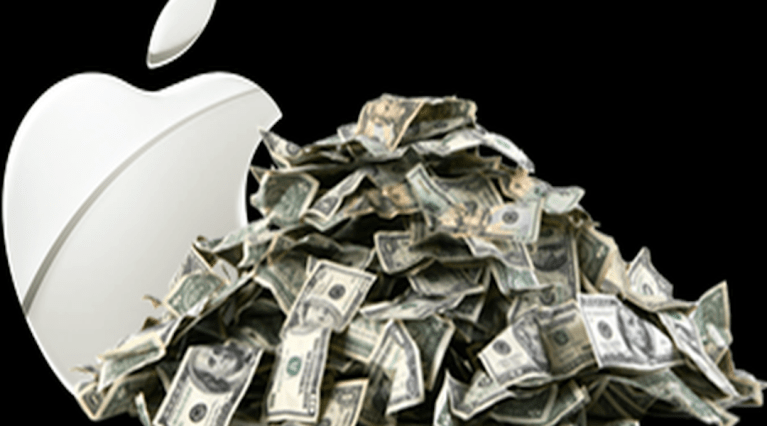Apple’s $250B Cash Hoard

When Apple comes out with earnings later this week, it is widely expected to report that its cash on hand has met and exceeded the quarter of a trillion dollars mark. In perspective, that is more cash on hand than the market cap of Walmart and the foreign-currency reserves held by the U.K. and Canada combined.
Apple, if its free cash meets expectations, will have roughly doubled its holding in a little over 4.5 years — in the last quarter of last year Apple was reportedly bringing in about $3.6 million per hour in revenue.
Most of that money is parked off-shore, a situation that President Trump seems to be aiming at ameliorating with a one-time tax holiday on corporate funds brought home paired with reforms that will lower corporate taxes. Apple CEO Tim Cook has signaled in previous interviews that he would happily bring the cash home if the tax structure of the U.S. would allow it. CFO Luca Maestri has noted that bringing the money back to U.S. soil would give Apple flexibility to do more capital returns — though what that might look like remains unknown.
Counting out financial firms, Apple’s free cash amount is larger than that of any U.S. firm now or in the recent past.
“I have never seen a company in this kind of extreme position, barring a winding-down,” noted Jennifer Blouin, an accounting professor at University of Pennsylvania’s Wharton School. “Apple’s a cash box right now.”
Apple cash and cash equivalents are spread across short- and long-term securities, including corporate securities, U.S. Treasury securities and money-market funds.
The iPhone is the backbone of the Apple cash printing operation — Apple has sold more than 1 billion of the devices in the decade since it was introduced, and today claims 91 percent of all the profits in the smartphone sector.
Steve Jobs, the CEO behind the iPhone, was notoriously skeptical of shareholder buybacks, preferring to boost stock price with new products to market. Mr. Cook, Steve Jobs’ replacement, began a program of dividends and stock buybacks in 2012 that has since sent more than $200 billion to shareholders. Cook also found himself involved in a showdown with activist investor Carl Icahn, who bought a large stake in Apple and began lobbying aggressively for buybacks.
Apple spends less in some areas than its competition as well — notably in advertising and acquisitions. It bought at a rate of 15 to 20 companies a year over the past four years. Those firms tend to run Apple a few hundred million dollars and are focused in areas that Apple can easily fold into its existing infrastructure.
The massive pile of cash, however, has left many wondering if Apple might have bigger buys in its future. One investor directly asked last year if Apple would considering buying Tesla. Cook did not respond one way or the other. Netflix has also been a favored possible acquisition target.
Notably, Apple can currently afford to buy both firms and still have a massive pile of cash left over.
But whatever it does, the market is beginning to agree that Apple should do something, since it now has an almost wasteful amount of cash on hand.
“If this a rainy-day fund, they’re saving for a millennial flood,” said Lee Pinkowitz, a Georgetown University professor of finance.